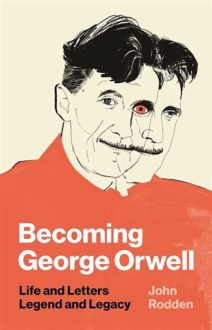Here is a shorter version of a review I wrote for the Orwell Society website.
John Rodden is widely regarded as the world’s leading authority on the legacy of George Orwell. Beginning with The Politics of Literary Reputation The Making and Claiming of ‘St George’ Orwell in 1989, he has established himself as the foremost expert on the cultural and political impact of Orwell on the world. His latest book more than justifies that reputation.
Rodden draws a distinction between Orwell the man and his work and “Orwell” the legend he has become in everyday discourse which often distorts and misconstrues who he really was and what he stood for. He is refreshingly honest in describing Orwell as his “intellectual big brother” to whom he feels a special affinity and reveals the personal debt he owes Orwell in enabling him to resolve his own issues of personal identity as a writer and aspiring intellectual.
His overview of Eric Blair’s life and work is brief but informative but, despite the ever-expanding Orwell industry, Rodden manages to come up with several original angles on the Orwell story. He makes a convincing case for the publication of the essay ‘A Hanging’ in the New Adelphi magazine in September 1931 as representing Eric Blair’s literary, political and intellectual breakthrough when he became a masterly writer. He also has a fascinating chapter on the favourable reception of Orwell from the 1930s onwards by the influential American Catholic magazine Commonweal which helped to secure his reputation amongst not only American Catholics but the wider public.
He emphasises the importance of Orwell’s French connections by drawing comparisons with the now forgotten French novelist Jean Malaquais and the much better known Algerian writer Albert Camus. Interestingly, Camus’ novel The Plague has again become a best seller as a result of the Covid-19 pandemic. Rodden sums them up as “Intellectual integrity, moral courage, and literary excellence: George Orwell and Albert Camus.” He is suitably perceptive about the role of what he calls the twin masterpieces of Animal Farm and Nineteen Eighty-Four in cementing Orwell’s reputation. He says that the American Book-of-the-Month Club’s selection of Animal Farm in September 1946 is the key to understanding Orwell’s worldwide fame today. It sold 460,000 copies between 1946 and 1949. The range and depth of Rodden’s knowledge and understanding of post-World War II literature and worldwide responses to Orwell are unparalleled and inform whatever aspects of Orwell and his legacy he analyses.

His concluding chapters examine the intriguing questions of Orwell’s relevance today and what importance his work will have in the future. He believes that whilst Orwell’s life and work have been exhaustively studied, new perspectives on the legend and legacy of his doppelgänger “Orwell” will continue to emerge because of the ongoing tendencies towards surveillance and authoritarian power throughout the world. He also sees China and India as offering new theatres for the deployment of Orwell scholarship.
The American cartoon drawings and other images in the book vividly illustrate how Orwell’s creation Big Brother has been used to portray the surveillance society of Robert Kennedy, Barack Obama and, especially pertinent today, Donald Trump’s America. The 40 pages of Notes at the end are extremely informative extensions and reinforcements of Rodden’s arguments and an excellent resource for further study of Orwell and his legacy. The Notes consider alternative famous literary quotations to “Big Brother is Watching You” and conclude that none come close in the popular imagination. They are chock-full of fascinating literary insights into e.g. Anthony Burgess, E.P. Thompson, Raymond Williams, Norman Mailer, Christopher Hitchens and even the compartmentalised friendships and secret love lives which Charles Dickens and Orwell both hid. Becoming George Orwell Life and Letters Legend and Legacy makes for an engrossing and illuminating read.
My full review is on the Orwell Society website at https://bit.ly/Orwellreview.




